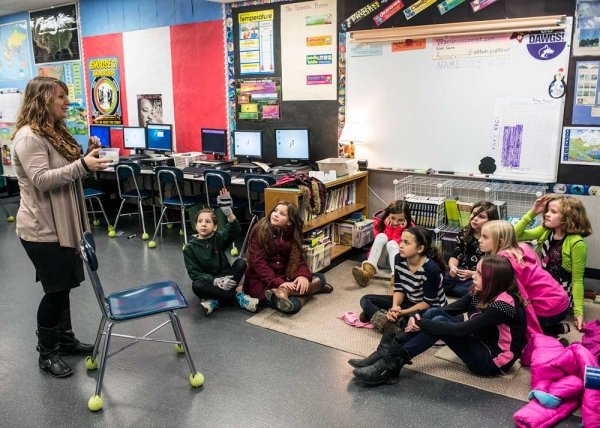 Jane Duea, Evergreen Elementary coordinator for Community In Schools of Peninsula works with a group of fifth-graders last month. Photo by Ed Johnson, KP News
Jane Duea, Evergreen Elementary coordinator for Community In Schools of Peninsula works with a group of fifth-graders last month. Photo by Ed Johnson, KP News
Since then, it’s grown to its current presence in 10 of the 15 schools in the Peninsula School District, including all the schools in the Key Peninsula, according to Executive Director Coleen Speer.
Nationally, CISP was founded about 35 years ago and it’s currently headquartered in Washington D.C.
CISP’s goal is to help kids who are below grade level in reading or math by pairing them with volunteer mentors who work one-on-one with students.
Currently, there are 140 CISP volunteers mentoring students in afterschool and in-school sessions.
There are also eight program coordinators –– mostly teachers in the school ––who are paid by CISP to oversee the programs.
The mentor list includes business people, retirees and even high school students doing community service, Speer said.
Laura Schulz is CISP program director at Vaughn Elementary. “We do both reading and math here at Vaughn,”Schulz said. “Our students get together with their mentors once a week, an hour and a half for math or an hour for reading.”
All mentors are screened (including a background check through Washington State Patrol) and attend regular training sessions.
And the CISP program meets the kids’needs in more than just academic ways, Speer said.
“The relationship between mentor and student is very important,”Schultz added.
“It shows kids that they really matter and that they can be successful. And for students who come from all types of backgrounds, even those who have the most supportive families, talking to another adult or a high school student about how to stay motivated, how to do their best work in school, is huge,” she said.
There are even CISP programs at Peninsula and Henderson Bay high schools.
“At the high school level we now have students who recognize our programs and they self-refer. They just drop in to work with a volunteer,”Schulz said. “That’s huge.”
CISP always needs more volunteers, she added.
The time commitment includes about two hours of training and then weekly meetings with the student throughout the school year.
It’s a long term commitment because, “once you start with a student, we expect you to continue with the program all the way through ‘til the end of the school year, the last week in May,”Schultz said.“That long-term consistency with a student is what really leads to the best growth.”
Volunteers follow the standard school schedule including school holidays and other breaks.
“We actually have a very high retention rate with our volunteers and they return year after year because they find it very rewarding and they love working with kids. That’s the beautiful thing about working with young people ––you often see great growth,”Schulz said. “The kids have a great sense of humor and wonderful skills, but they might just have a deficit in reading or math.”
Although CISP is part of a national organization, it is its own 501c3, with its own board of directors and fundraising obligations.
“I write lots of grants and we have fundraisers,”Speer said. “We ask individual donors for money. We have some corporate gifts. And the community can donate though our website. We have on-line giving.
“We’re grateful for every monetary gift. And the gift of your time is priceless,”Schulz said. “It absolutely pays off in grades and confidence.”
To donate or to learn more about being a CISP volunteer, visit peninsula.ciswa.org.
UNDERWRITTEN BY THE FUND FOR NONPROFIT NEWS (NEWSMATCH) AT THE MIAMI FOUNDATION, THE ANGEL GUILD, ADVERTISERS, DONORS AND PEOPLE WHO SUPPORT INDEPENDENT, NONPROFIT LOCAL NEWS